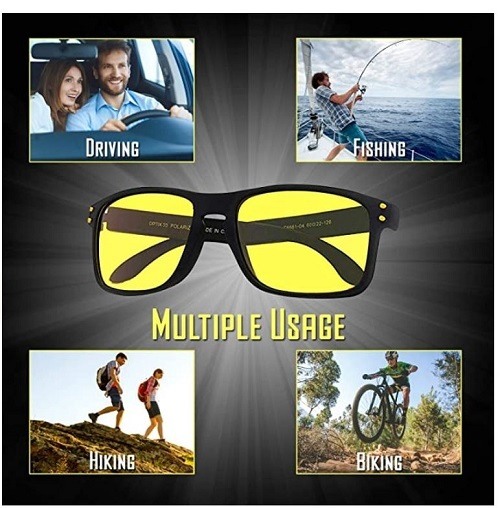Not seeing clearly when driving at nighttime is a frequent complaint.
Poor night vision can affect individuals of any age, but it tends to be exceptionally troublesome after age 40.
Perhaps you've heard or seen of special eyeglasses with tinted lenses designed to help you see better in nighttime driving.
Do these "night driving glasses" really work?
Keep reading to learn the truth.
What Are ‘Night Driving Glasses’?
Night Driving glasses are non-prescription glasses that contain yellow-tinted lenses.
Essentially, they're the exact same thing as "shooter eyeglasses," which have existed for many years.
Night driving glasses typically also incorporate an anti-reflective coating to reduce internal reflection of light from oncoming headlights, interior auto lights and streetlights that can create glare.
Many hunters and others who use yellow-tinted glasses for different sports have learned that these special lenses increase the contrast of objects against an overcast sky.
This feature also makes these eyeglasses wildly popular with bird hunters.
But do they really help you see clearly when driving at night?
Why Night Driving Glasses May Be A Bad Idea
Glasses with yellow-tinted lenses do improve contrast in certain daylight conditions. This is because the yellow tint blocks blue light from sunlight. Blue light has the shortest wavelengths and the maximum energy, so it is the part of the light spectrum that contributes most to glare.
This high-energy visible (HEV) blue light is more inclined to cause glare once it enters the eye, compared with other visible light, which has longer wavelengths.
The "blue obstructing" filtration provided by yellow lenses also occurs when using copper- and amber-colored lenses. In fact, those darker shades of yellow block more blue light than yellow lenses -- but they also stop more light from penetrating the eye, which diminishes visibility in low-light problems.
In fact, even the lightest yellow lenses diminish overall visible light to a degree by blocking some of the HEV blue light beams.
This can be a fantastic thing for visibility in the daytime, but not so at night.
Research Shows No Advantage
Researchers at the Schepens Eye Research Institute in Boston recently performed a study to discover whether night driving glasses offer any visual advantage in simulated nighttime driving conditions.
A total of 22 adults in a wide range of ages engaged was published in 2019. All candidates "drove" in four improved night-driving restrictions, using either glasses with clear lenses or yellow-tinted night driving glasses.
In addition, each candidate drove in conditions with and without a headlight flash simulator to mimic oncoming traffic.
In each scenario, the participants' response time to seeing a pedestrian walking along with the simulated roadway was measured.
The study found that nighttime driving glasses did not improve pedestrian detection at night nor decrease the adverse effects of headlight glare on pedestrian detection performance.
"Our data indicate that wearing yellow lens glasses at night doesn't improve performance at the most crucial job: detection of pedestrians," the study authors said.
"Instead, the data revealed that wearing yellow lens eyeglasses may somewhat worsen appearance, however that finding wasn't statistically significant.
"These findings don't seem to support having eye care experts recommend patients to use yellow-lens night-driving glasses," they concluded.
Are night driving glasses best for you?
Locate an eye doctor near you and schedule an appointment.
The Best Glasses For Night Driving

To get the best night driving vision, first visit an eye doctor to get a detailed eye exam.
Many individuals who believe they see "just fine" are amazed when they find out how much clearer they could see at night when even a small number of uncorrected refractive error is adjusted with new glasses.
If your eyes are healthy and without refractive errors requiring correction with prescription glasses, then the best glasses for night driving for you are…
…no glasses at all.
On the other hand, if you need prescription glasses to correct nearsightedness, farsightedness or astigmatism, select clear corrective lenses using an anti-reflective coating. These lenses allow 100 percent of visible light to enter your eye and be adequately focused on the best vision.
The anti-reflective (AR) coating also reduces internal reflections of oncoming headlights and streetlights on your lenses, which are common sources of glare.
You might also consider the same kind of glasses - clear lenses and AR coating - even if you don’t need vision correction.
But do not waste your money - AR coatings only lessen glare caused by reflection off of the lenses themselves.
And they are not that expensive - so don’t be fooled.